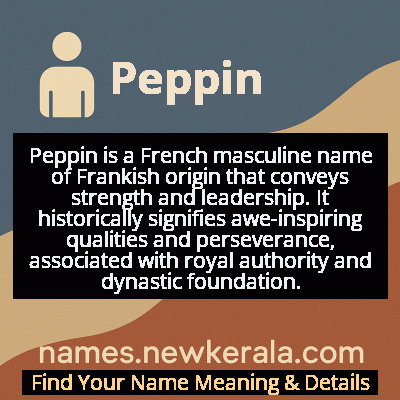Peppin Name Meaning & Details
Origin, Popularity, Numerology Analysis & Name Meaning of Peppin
Discover the origin, meaning, and cultural significance of the name PEPPIN. Delve into its historical roots and explore the lasting impact it has had on communities and traditions.
Name
Peppin
Gender
Male
Origin
French
Lucky Number
4
Meaning of the Name - Peppin
Peppin is a French masculine name of Frankish origin that conveys strength and leadership. It historically signifies awe-inspiring qualities and perseverance, associated with royal authority and dynastic foundation.
Peppin - Complete Numerology Analysis
Your Numerology Number
Based on Pythagorean Numerology System
Ruling Planet
Uranus (Rahu)
Positive Nature
Strong sense of order, loyal, practical, and disciplined.
Negative Traits
Stubborn, overly serious, rigid, and prone to feeling restricted.
Lucky Colours
Blue, gray.
Lucky Days
Saturday.
Lucky Stones
Blue sapphire.
Harmony Numbers
1, 7, 8.
Best Suited Professions
Managers, engineers, accountants, organizers.
What People Like About You
Dependability, discipline, practicality.
Famous People Named Peppin
Pepin the Short
Frankish King
Founded Carolingian dynasty, father of Charlemagne
Pepin of Herstal
Frankish Statesman
Unified Frankish kingdoms as Mayor of the Palace
Pepin I of Aquitaine
Frankish King
Ruled Aquitaine and defended against Viking invasions
Pepin II of Aquitaine
Frankish Ruler
Last independent ruler of Aquitaine before Carolingian absorption
Name Variations & International Equivalents
Click on blue names to explore their detailed meanings. Gray names with will be available soon.
Cultural & Historical Significance
Extended Personality Analysis
Individuals bearing the name Peppin are typically associated with qualities of steadfast leadership, practical intelligence, and strategic foresight. Drawing from the historical figures who carried this name, Peppins are often perceived as methodical planners who prefer substance over showmanship. They tend to be resilient in the face of adversity, possessing the patience to work toward long-term goals rather than seeking immediate gratification. Their leadership style is often characterized by quiet competence and reliability rather than flamboyant charisma. Peppins are generally seen as traditional yet adaptable—respectful of established systems while recognizing when change is necessary. They value loyalty and tend to inspire deep commitment in those who work with them. In personal relationships, they are often the stable, dependable anchors who provide consistent support and wise counsel. Their strength lies in their ability to build lasting foundations in both personal and professional contexts, mirroring the dynastic legacy of their historical namesakes. While they may not seek the spotlight, they often find themselves in positions of responsibility due to their proven capability and trustworthiness.
Modern Usage & Popularity
In contemporary naming practices, Peppin remains an uncommon but culturally significant choice, primarily favored by parents with an appreciation for French history or medieval heritage. The name maintains a consistent but minimal presence in birth registries, particularly in France and French-speaking regions. Its usage saw a modest increase during the 19th century medieval revival movement and again in the late 20th century as parents sought distinctive historical names. While never approaching the popularity of classic French royal names like Louis or Charles, Peppin offers a unique alternative that carries similar regal connotations without being overused. The name's association with J.R.R. Tolkien's Peregrin 'Pippin' Took has introduced it to broader audiences, though most parents choosing the name specifically reference the French royal heritage. In recent years, it has found some traction among parents seeking names that are both historically grounded and sufficiently rare to stand out in modern settings.
Symbolic & Spiritual Meanings
Symbolically, Peppin represents the foundation upon which great legacies are built. The name embodies the concept of transformative leadership that operates both visibly and behind the scenes, reflecting the historical Pepins who governed as Mayors of the Palace before ascending to kingship. It symbolizes the patience required to build enduring institutions and the wisdom to know when to transition from supporting roles to positions of overt authority. Metaphorically, Peppin suggests the strength of deep roots and historical continuity—the understanding that present achievements rest upon foundations laid by predecessors. The name also carries connotations of practical sovereignty: the ability to wield power effectively without unnecessary ostentation. It represents the bridge between tradition and innovation, honoring established systems while recognizing the need for evolution. In a broader sense, Peppin symbolizes the creation of dynasty and legacy—not just through bloodline, but through the establishment of lasting political and cultural institutions that transcend individual lifetimes.

